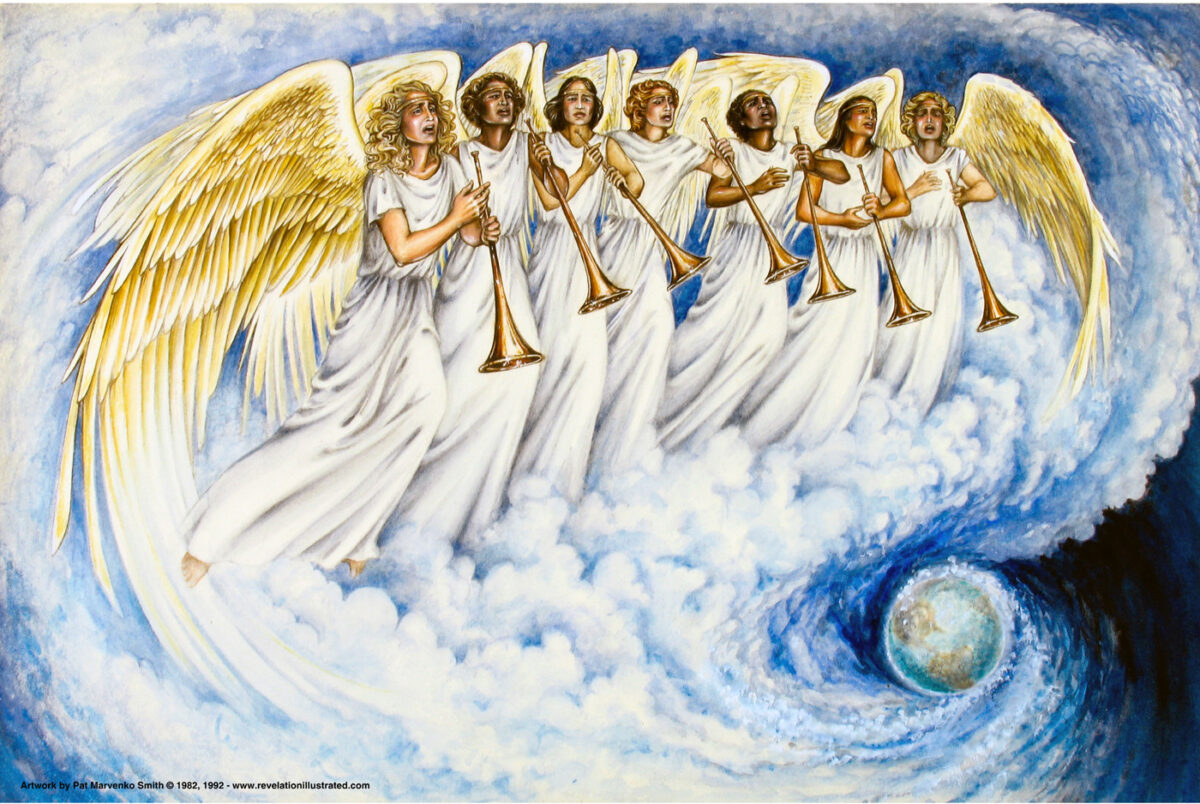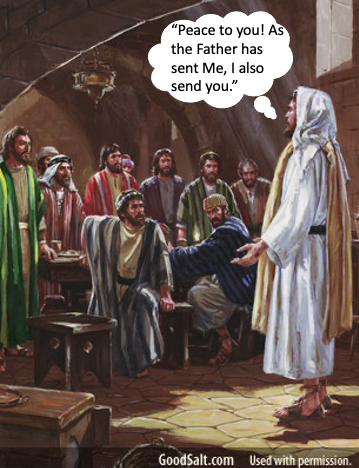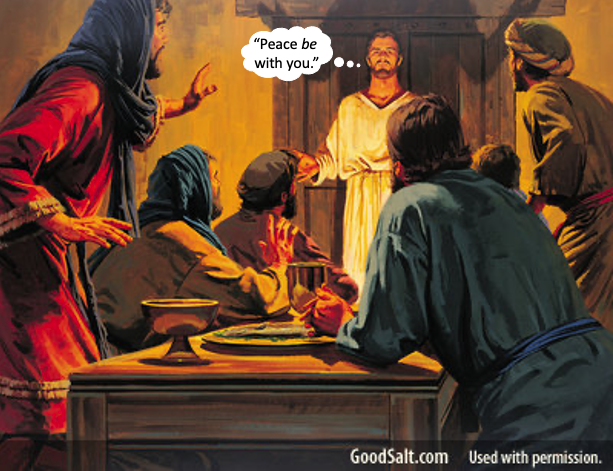“But the woman was given two wings of a great eagle, that she might fly into the wilderness to her place, where she is nourished for a time and times and half a time, from the presence of the serpent.” Revelation 12:14
Following Satan’s defeat and his eviction from heaven to earth (12:7-12), he directs all his rage at the nation of Israel knowing he has a short time left. Satan can read the book of Revelation too and he knows he is going to be bound in the bottomless pit for a thousand years after Jesus’ return to earth (Revelation 12:13-17; 20:1-3). 1 The apostle John writes, “Now when the dragon saw that he had been cast to the earth, he persecuted the woman who gave birth to the male Child.” (Revelation 12:13). Since Satan (dragon) could not get to the Christ Child or His church who ascended victoriously to heaven (12:5; cf. 4:1-4), he will persecute “the woman,” which represents the nation of Israel (12:1-2; cf. Genesis 37:9-11), “who gave birth to the male Child.” Satan’s goal during the last half of the Tribulation period will be to destroy Israel and thus render God’s promises to Israel false, making God a liar. 2
Hitchcock writes, “Satan focuses his fury on the woman and tries to wipe out the Jewish people once and for all to thwart the promises of God. He will embark on an all-out, worldwide campaign of anti-Semitism. This will mark the culmination of Satan’s agelong war against the Jewish people. But his attempts always backfire. Have you ever noticed that every time Satan tries to wipe out the Jews, they end up with a holiday? After Pharaoh’s brutal enslavement, they got Passover. After Haman’s plot in Esther to wipe them out, they got the Festival of Purim. After the atrocities of Antiochus Epiphanes in the intertestamental period, they got Hanukkah, or the Feast of Lights. And after Hitler’s holocaust, they got May 14, 1948—the rebirth of the modern state of Israel. Satan’s final assault against Israel will also fail. It will result in the repentance of Israel, the second coming of Jesus, and the establishment of the Messianic kingdom.” 3
Swindoll says, “Satan has inspired countless attempts at destroying God’s special covenant people. Throughout history, the Jews have been the special object of hatred, ridicule, and persecution. During the Middle Ages, they were looked on with suspicion and treated as outcasts in a world dominated by a form of political Christianity that viewed all Jews as Christ-killers. During World War II, the Nazis attempted to obliterate the Jewish people in a horrific holocaust driven by absolute evil. Even after the birth of the modern nation of Israel in 1948, its neighboring nations in the Middle East have often talked of driving the Jews into the sea and retaking the land. Anti-Semitism has a long and sordid history. Yet God has continued to fulfill His promise to preserve Israel, even in their spiritually blind condition of rejecting Jesus as their Messiah (Rom. 11:28-29).” 4
Just as God has preserved the nation of Israel since her birth over four thousand years ago (Genesis 12:1-3), so He will continue to sustain them during the last half of the Tribulation when all of hell’s fury is directed against them. “But the woman was given two wings of a great eagle, that she might fly into the wilderness to her place, where she is nourished for a time and times and half a time, from the presence of the serpent.” (Revelation 12:14). During the last half of the Tribulation period, many believing Jews will obey Jesus’ command to flee Judea when the Man of Sin takes his place in the rebuilt Jewish temple in Jerusalem (Matthew 24:15-16; 2 Thessalonians 2:3-4) and God will give them supernatural speed (“two wings of a great eagle”) that they may quickly take refuge in the “wilderness to her place” of total security. “The comparison between a powerful “eagle,” that can “fly” very fast overhead, going wherever it chooses, and an earth-bound “serpent,” implies the superior protection of God.” 5
“This hiding place was not clearly identified. Some suggest that it might be Petra, fortress capital of the Nabateans in Edom, south of the Dead Sea. This city has a narrow access which could easily be blocked but which opens up into a large canyon capable of caring for many thousands of people. Though Scripture is not specific, some believe the 144,000 of chapter 7 are to be preserved here. The Scriptures themselves speak of God’s seal of protection on them.
“The two wings probably do not refer to modern airplanes but rather to God’s delivering power, and are a figure of speech taken from such Old Testament passages as Exodus 19:4 and Deuteronomy 32:11-12. The flight of Israel to a place of safety was also indicated in Matthew 24:16; Mark 13:14; and Luke 21:21.” 6
It is at this place in the wilderness “where she is nourished for a time and times and half a time.” “This refers to the three and one-half years of the Great Tribulation with ‘a time’ equaling one year, ‘times’ equaling two years, and ‘half a time’ indicating 6 months (cf. Daniel 7:25; 12:7 with the 42 months referred to in Revelation 11:2; 13:5). References to these specific time periods show that the Great Tribulation is not the entire present Age but the three and one-half years preceding the second coming of Christ.” 7
God would supernaturally feed and protect the Israelites in this place of refuge much like He fed the Israelites in the wilderness and Elijah by the brook Cherith. 8 This would take place away “from the presence of the serpent” (Satan – 12:14) who will try to destroy them by means of the armies of the Man of Sin. 9 “15 So the serpent spewed water out of his mouth like a flood after the woman, that he might cause her to be carried away by the flood. 16 But the earth helped the woman, and the earth opened its mouth and swallowed up the flood which the dragon had spewed out of his mouth.” (Revelation 12:15-16). When Satan (“the serpent”) realizes his enemies, the believing Jews (“the woman”), have obediently fled Judea, he sends a “flood” of armies after them who will be miraculously “swallowed up” by “the earth.”
In the Old Testament, overflowing waters and floods are sometimes used symbolically to represent military attack (cf. Isaiah 8:7-8; Jeremiah 47:2-3). 10 For example, this image of a flood overtaking Israel is also seen in Daniel 9:26, a prophetic reference to the Roman invasion that destroyed Jerusalem and the temple in AD 70: “And the people of the prince who is to come shall destroy the city and the sanctuary. The end of it shall be with a flood, and till the end of the war desolations are determined.” 11 Soon after the Man of Sin sits in the rebuilt Jewish temple, declaring himself to be God (cf. 2 Thessalonians 2:3-4), he will discover that his enemies (the believing Jewish remnant) are escaping and will send a flood of soldiers after them. However, just as He did in the past on behalf of His people (cf. Exodus 15:12; Psalm 106:17), God will miraculously open an enormous crevice in the earth that will swallow the soldiers of the Man of Sin alive. 12 Two thirds of these Israelites will die, and one third will escape (Zechariah 13:8-9). 13
We learn an important principle from this particular prophecy: “We discover God most powerfully in the context of being overwhelmed. When believers are flooded with opposition, often they are able to watch God supernaturally suck up the flood of despair and avert Satan’s plan for destruction.” (Emphasis mine). 14
Enraged by the escape of all these Israelites, Satan will now focus his attack on the 144,000 Jewish evangelists who are sharing the gospel around the world (cf. 7:1-8; 14:1-5; Matthew 24:14). “And the dragon was enraged with the woman, and he went to make war with the rest of her offspring, who keep the commandments of God and have the testimony of Jesus Christ.” (Revelation 12:17). These evangelists are described as those “who keep the commandments of God and have the testimony of Jesus.” The 144,000 are more than believers in Jesus. They are committed followers of Christ who are supernaturally protected by God so they can make Jesus Christ known during an unprecedented time of deception and persecution throughout the world.
“Revelation 12 teaches us that Israel may be blind and disobedient as a nation, but God has never forgotten them. He never will. His reputation as a promise keeper is at stake. God will remember His people and preserve them. He will protect them when persecution arises, and He will ultimately fulfill His promise to return them to their own land under the Messiah. Although most ethnic Jews have not accepted Jesus as their Messiah, God has still preserved them as a distinct people over the last two thousand years. In Romans 11:1 Paul wrote, ‘God has not rejected His people, has He? May it never be!’ The fact of God’s faithfulness even to faithless Israel should give us hope, too! The same God who stands by His promises to Israel stands by His promise to each of us: ‘I will never desert you, nor will I ever forsake you’ (Heb. 13:5).” 15
We also learn from Revelation 12, that the dragon still comes after children of God, and sometimes he gets them (12:13-17). You and I might face the dragon in different ways, but we still face him daily. For John, that is part of the true meaning of the story of Christ’s birth. The message of the coming of Christ into the world is not peace and joy for all. The world has churned on for two thousand years since the pronouncement of the angels, and there has never been lasting peace on earth or good will toward men. But then, that was never the promise, was it? Notice what it was the angels really promised to the shepherds, “Give glory to God in heaven, and on earth let there be peace among the people who please God” (Luke 2:14 NCV). The promise of peace is for those who please God, those who follow the Lamb. The dragon will continue to attack, but the battle belongs to the Lord. Do you belong to Him?
Prayer: Lord God Almighty, we thank You for our verses in Revelation 12 today which emphasize Your supernatural protection and provision of Your people Israel despite all the fury of hell directed against them. We are reminded that during times when we are most overwhelmed, we discover You in the most powerful ways when You seem to supernaturally suck up the flood of our despair and turn away Satan’s plan for destruction. Your faithfulness to faithless Israel gives us hope because we too can be faithless especially when we are overwhelmed. You are the same God Who keeps His promises to Israel Who stands by His promises to us. When You say, “I will never leave you nor forsake you” (Hebrews 13:5), we can be confident You will never abandon us no matter what hardships we face. Thank You for the security this gives us. Thank You for the peace You give to us when we make it our aim to please You. In the mighty name of Jesus Christ, we pray. Amen.
ENDNOTES:
1. Tony Evans, CSB Bibles by Holman, The Tony Evans Bible Commentary (B & H Publishing Group, Kindle Edition, 2019), pg. 2398.
2. Ibid.
3. Mark Hitchcock, The End: A Complete Overview of Bible Prophecy and the End of Days (Carol Stream, IL: Tyndale House Publishers, Inc., 2012 Kindle Edition), pp. 314-315.
4. Charles R. Swindoll, Insights on Revelation (Swindoll’s Living Insights New Testament Commentary Book 15, Tyndale House Publishers, Inc., 2014 Kindle Edition), pg. 240.
5. Tom Constable, Notes on Revelation, 2017 Edition, pg. 138.
6. John F. Walvoord, The Bible Knowledge Commentary Epistles and Prophecy, Editors John F. Walvoord and Roy B. Zuck, (David C Cook, 2018 Kindle Edition), location 5718 to 5724.
7. Ibid., location 5724 to 5729.
8. Constable, pg. 138.
9. Bob Vacendak; Robert Wilkin; J. Bond; Gary Derickson; Brad Doskocil; Zane Hodges; Dwight Hunt; Shawn Leach. The Grace New Testament Commentary: Revised Edition (Grace Evangelical Society, Kindle Edition, 2019), pg. 1544.
10. Ibid.
11. Swindoll, pg. 240.
12. Vacendak, pg. 1544.
13. Constable, pg. 138.
14. Evans, pg. 2399.
15. Swindoll, pg. 241.












